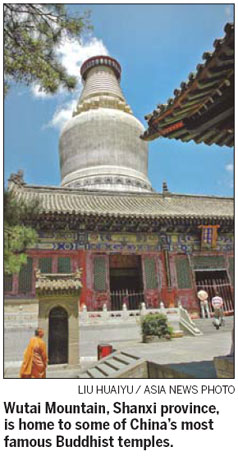A sacred land of kind people and uplifting sights
By Wang Junjing (China Daily)
Updated: 2010-05-06 10:46
 |
Large Medium Small |
My hometown Xinzhou, in Shanxi province, is located in the Loess Plateau through which flows the Yellow River. The highland not only nurtures people known for being kind and diligent, but is also famous for its unique natural beauty and unparalleled cultural heritage.

One of its top attractions is Wutai Mountain, a popular summer resort and a Buddhist holy mountain, home to many of the country's most famous temples. The mountain draws huge crowds in the summer, the peak season for visitors.
Though I'm not a devout Buddhist, I love the atmosphere in the mountain. When I hear the sounds of drums and bells from the monasteries and watch the monks in prayer, I feel a great peace in this sacred place.
To maintain their sanctity, the selling of souvenirs and Buddhist artifacts is restricted to outside the temples.
If lucky, you may even catch sight of yuan guang, a special ring-like rainbow that appears on sunny days above the mountain. What makes it more fascinating is that you can see reflections of animals, temples, Buddhas, and even yourselves, in the ring. This mysterious phenomenon is considered one of "the treasures of Wutai Mountain".
While the landscape of my hometown is a feast for the eyes, its many local delicacies are bound to tease your palate. Taimo, mountain mushrooms, are a mouth-watering treat, either simply fried or stewed with chicken, and they are available at most local restaurants.
Xinzhou's quiet ambience and beautiful landscape make it a perfect long-weekend getaway, and a range of accommodation - from hotels to homestays - is available.
Another place of interest is the home of Diaochan, one of the Four Beauties of ancient China.
According to local legend, the peach trees in this village stopped blossoming three years before Diaochan's birth during the Han Dynasty (206 BC-AD 220), in deference to her beauty.
Xinzhou's Yuwang (King Yu) cavern gets its name from Dayu, the first ruler and founder of China's first dynasty, Xia Dynasty (c. 21st century-16th century BC).
The mountain where Yuwang cavern is located is called Jizhou, which means fastening a boat. It is believed that Dayu anchored his boat near this mountain to fight the Yellow River floods. Nobody knows how deep the cavern is, but everybody who has been here talks of how mysterious and beautiful it is.
Numerous animal and plant species can be found here, besides many uniquely shaped rocks.
Known as "Home of wrestling" and "Sea of Folk Songs", Xinzhou's annual Wrestling Festival in September, is another big tourist draw.
Errentai, a kind of folk song, are familiar to many here, especially the elderly.
Even through I have been away from my hometown for many years, it will always remain an inspirational part of my life.